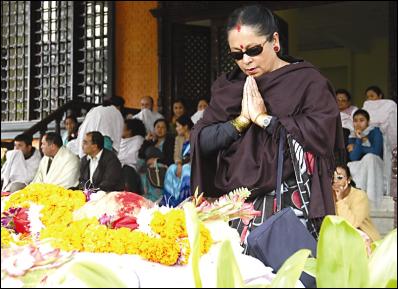Nepal: The History Ends
By Indra Adhikari
Nepalese mourned the thirteenth day of the dead music veteran Shiva Shankar Manandhar on Sunday. They promised to keep up his aspirations of music promotion in the country.

Bhuwan Chand, the co-star of Aama film gives final farewell to shiva shankar. photo by Sagar Shrestha.
Shiva Shankar Manandhar, who has influenced virtually every aspect of Nepalese music for 50 years, died of lung cancer last week. He was 72.
During the past four decades, his name has probably been mentioned more often in books, journals, lectures and conversations about Nepalese music than any other musician. His music was both patriotic and sentimental—among the most touching songs of his generation—and spoke to people of all ages. If he is remembered by posterity it will be for his contribution to the development of Nepalese music while preserving its heritage and originality.
Shiv Shankar's co-workers describe him as a man of destiny and remarkable generosity, someone who was down-to-earth and deeply committed to his work. Premdhoj Pradhan recalls the days when Shiv Shankar would work for a week to give a song one final touch. He was even stubborn and demanding with words, forcing them to do as he willed. He worked odd hours; he worked without food. He would refuse to meet visitors without an appointment.
Those who have associated with him closely say he was a man with an impeccable sense of timing, in his music and his work. His habit of sticking firmly to a schedule helped him to build Radio Nepal, which had just been formed when he joined it in 2007 B.S. There was fierce competition for positions there, as it was the only medium at the time that reached the general public. Radio Nepal attracted great talent but also needed an able person to coordinate and manage it. Shiv Shankar proved to be the right person for the position.
Commercial music in Nepal was in its infancy when Shiv Shankar started his career. Except for a few performances on public stages, there was little opportunity for music to grow. Indian music enjoyed a dominant position. Promoting Nepalese music to new heights was the goal; Radio Nepal became the medium, and Shiv Shankar became the model. He was an impresario, producer, composer and arranger who did much to expand the popularity of Nepalese music.
According to Pradhan, Shiv Shankar was the father of the adhunik geet, the modern Nepalese song. The trend he started led to the revolution in the music industry and eventually to the rise of pop music that has won the hearts of youngsters. In his four decades of service to Radio Nepal, Nepalese music grew into full flower. In the beginning, when there were only lok geet, folk songs. The introduction of modern styles drew criticism, but Shiv Shankar eventually won listeners over. His fans, music lovers and aspiring musicians sent him letters: He replied to all with handwritten responses that were invariably positive and encouraging.
Shiv Shankar always favored change. He encouraged emerging artists and promoted music, even pop songs, always stressing originality and musical roots. He was fond of using the newest technologies available to make the work easier and the music better. He taught his protégés fairness and loyalty, concentration and dedication to their work.
Shiv Shankar's career began in his late teens; he joined Radio Nepal at 19, along with Koili Devi, Natikaji, Pannakaji, Hari Prasad Rimal and Bhairab Bahadur Thapa. His first song, "Yo Kholako Pani, Euta Rumal Dhundaima Din Jane," was recorded in 2015 B.S. in Mumbai. In 2021 B.S. Shiv Shankar played the lead role in "Aama," the first film made in Nepal. Although he did not act in any other film, the exposure advanced his career, and he, in turn, worked to advance the Nepalese film industry. Shiv Shankar wrote the music for more than 1,200 songs, sang more than 300 of those and composed music for more than a dozen films. For his contribution he was showered with many laurels, the most recent of those was the Natikaji Memorial award, which was presented to him just days before his death.
Shiv Shankar was not motivated by personal success and cared little for money. He was simple, quiet and shy. He liked to dress in simple clothes; his favorite dress was a brown safari suit. He was known to enjoy a drink and was a heavy smoker. The lung cancer that killed him was probably a result of smoking, even though he quit the habit three years ago at the request of his friends.
He was very devout, passing most mornings in his prayer room. Until recent years a walk in the mornings was a part of his daily schedule, and he was active in his neighborhood in Kalimati.
Shiv Shankar was born to Man Bahadur and Ram Maya on Falgun 12, 1989 B.S. on the day of Shivaratri, at New Road in Kathmandu. He attained his bachelor's degree in music from Kalanidhi Indira Sangeet Mahavidhyalaya and then devoted himself to his chosen career. In his 41 years of service at Radio Nepal, Nepalese music grew into full bloom. Hundreds of his students followed his lead: The strength and variety of Nepalese music today will give peace to his departed soul.
On the last day of Tihar, at around six in the evening, Shiv Shankar passed away at the Bhaktapur Cancer Hospital. His three sons, Gauri, Ravi and Shashi, performed his last rites at Aryaghat on Monday evening, the day following his death. Shiv Shankar's demise has brought to a close an important chapter in the history of Nepalese music. But his life's work has opened many more.


 Médecins Sans Frontières: Concern Over Planned Deportation Of Afghan Refugees In Pakistan
Médecins Sans Frontières: Concern Over Planned Deportation Of Afghan Refugees In Pakistan European Cultural Centre: Time Space Existence 2025 - A Collective Call To Repair, Regenerate, And Reuse
European Cultural Centre: Time Space Existence 2025 - A Collective Call To Repair, Regenerate, And Reuse John P. Ruehl, IMI: What Will Tech Moguls Do With Their Wealth?
John P. Ruehl, IMI: What Will Tech Moguls Do With Their Wealth? ITUC: Workers Must Not Pay The Price Of An Imposed Trade War
ITUC: Workers Must Not Pay The Price Of An Imposed Trade War Greenpeace: Major Deep Sea Mining Company Goes Bankrupt
Greenpeace: Major Deep Sea Mining Company Goes Bankrupt New Zealand Defence Force: Indian And New Zealand Navies Involved In $181m Drug Bust In Indian Ocean
New Zealand Defence Force: Indian And New Zealand Navies Involved In $181m Drug Bust In Indian Ocean